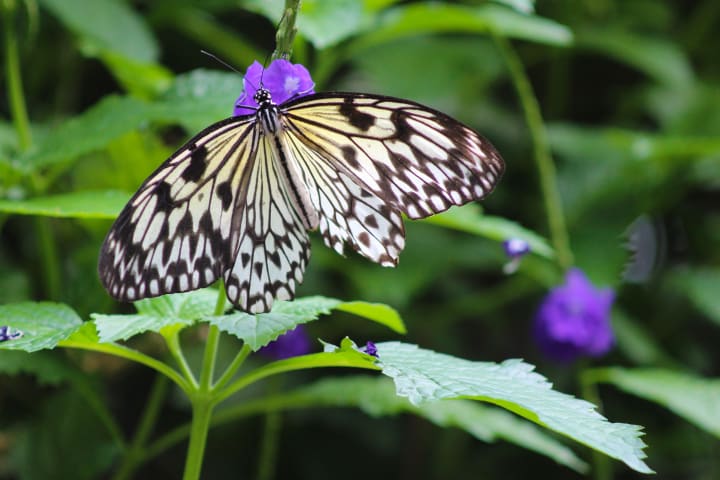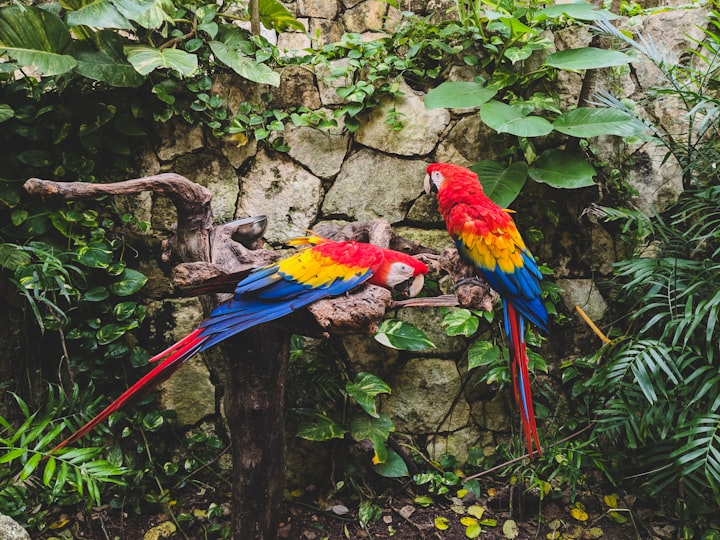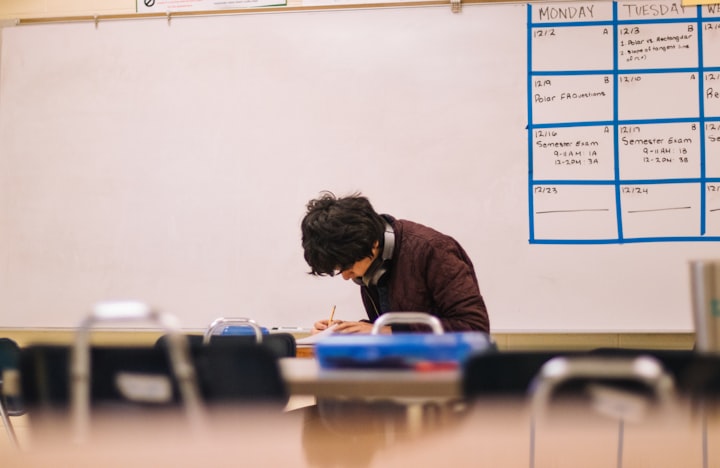Alligator Pear
The bounty of nature can assuage the pain of grief and loss.

"In Florida there are no mountains," she thought to herself as she gazed across the still waters. "But there are clouds. Mountainous clouds."
The billowing thunderhead at the horizon grew bright, illuminated by the early morning sun. For a moment it looked to her like snow on the Adirondacks.
She remembered: The rolling hills. The solitude. The cold, dry air.
Now she breathed in the humidity of the peninsula.
Her feet kept a rhythm on the sandy path in her early morning walks, and thoughts returned like old recordings, replaying, again and again.
She remembered the farm near the Finger Lakes, the fruit trees: cherry, peach, pear, apple. Above all, apple: Golden Delicious, Ginger Gold, Ruby Red, the sweetness, the subtle spice, the colors.
"How he loved New York," she thought, walking with a steady pace.
Thoughts repeated themselves. Voices came back to her.
“I can’t breathe.”
It was the last thing he had said. “I can’t breathe.”
No, no. Maybe not. Not quite the last. The nurse later told her he had said a few things before the ventilator. He wanted to make sure he would wake up again. He wanted assurances.
“But that can’t have been the last thing he said,” she thought again, as she went over those last painful days, trying to make sense of everything that had happened.
Her college friend had called some weeks later. “Come to Florida,” she said. “Your Manhattan dollars will go farther down here. You work from home now anyway. You need to start over.”
She remembered as she walked.

The sun was warm, so warm, the heat seemed a color. Yellow, bright, white. Even with her eyes lowered, she could see the colors of the sun. She breathed and tried to quiet her mind.
She walked, listening to her footsteps.
Then she heard a sound.
Low, deep, ancient, territorial. Almost a growl. Almost a rumble. Coming from the scrub along the lakeshore.
She quickened her pace. It sounded reptilian.
The male alligator, her neighbors had told her.
She was learning a lot from her neighbors.
“In every body of water in Florida, there’s a gator. You have to watch out.”
“Yes,” she thought as she hurried her step. It’s a jungle out there.
She reached into her pocket for a tangerine. Sweet, juicy, refreshing. You have to keep hydrated, she thought. This sun is relentless, even so early in the day.
She breathed deeply as she walked, admiring the butterflies, the birds, the scurrying insects, the occasional racoon or rabbit. So much life in this subtropical place, she thought to herself.

Her new neighbors had been so kind. She was amazed at the diversity of cultures and backgrounds they came from.
They gave her fruit from their gardens.
The Puerto Rican lady gave her star fruit. And limes. One fruit sweet, with the most amazing geometric shape, the other round as a green planet, and deliciously sour. The Cuban lady gave her nísperos, or loquats. It took her some time to learn how to eat them, to peel the small egg-shaped fruit and bite the orange flesh without swallowing the seed. The nice man from Haiti once gave her papayas. Imagine, she thought. Papayas grow in Florida. The young Dominican family next door gave her bananas, leaving an entire bunch of a small yellow variety on her front porch, grown right in their own backyard.
But it was the quiet man from India who gifted her most abundantly. He was a professor of biology and taught at the university before lockdown. “Everything online now,” he said with a lilt in his voice and a friendly sideways nod of the head. He prided himself on two immense avocado trees that shaded his house. “Sometimes they call them Alligator Pear,” he told her, as she cradled the large green bumpy ovals in both hands. "They are much bigger here," she thought, "than the ones I used to buy."
Most days she saw him. He tended vegetables in his large property. Now that he knew she liked them, he often had a paper bag of avocados waiting for her, there on the sidewalk, at a safe social distance. He was fond of saying simple but wise phrases. “Do not blame God for creating the alligator,” he called out one day. “But be thankful He did not give him wings.” She smiled. “Alligator Pear,” she thought, and she breathed a little more gently as she carried the green fruit to her house.
Another morning, when walking, she heard voices from a rooftop. One accent sounded Mexican, she thought, another Peruvian, perhaps Ecuadorian. There were five or six men up there, removing tile while enthusiastically talking about Messi and the latest scores. “No, no,” she thought, “that one must be from Colombia,” feeling a bit proud that she knew enough Spanish to tell by the accent where someone was from. “No saben que entiendo todo lo que dicen,” she thought to herself. She hesitated to call out buenos dias. They were on a roof. How can they balance like that? She did not want to distract them.
She walked along the avenida de los robles, the name she had silently given to the long stretch of magnificent oak. She tried counting the acorns around her feet. But still she could not quiet her mind.
Voices came back to her.
“I can’t breathe.”
Another voice. A different one. It had been in the news and then replayed during the trial. An officer’s knee on his neck. “I can’t breathe.”
“I can’t breathe.”
She tried to shake it out of her head. The hospital. The news. Turmoil. Anguish. Would it ever stop? She tried thinking of something else. She walked, trying to forget.
Was it really the last thing he had said?
She shook her head, hoping other thoughts would come.
Try listening, she thought to herself.
And she heard the soft sound of the wind rustle the palm fronds. It was a special soft sound. Soothing and smooth, almost silver sounding. Avenida de las palmeras, she thought, fond of the name she had given this stretch of the path. “Nothing like that sound anywhere else,” she thought as she took a deep breath, listening to the breezy rustle.
She heard the squawk of a great blue heron as it flew overhead. Their wingspan must be six feet, she thought, looking up. Six feet. That’s how tall he was. Or used to be, she thought. Or had been. He had been six feet tall.
And as she neared the lakeshore she could hear it, yes, even on a lake, the sound of soft waves. The wind had picked up enough to pull waves to the shore.

“We cannot change the direction of the wind,” the Indian professor had said to her one day, "but we can adjust the sails." She smiled a little.
She sat for a long while on the deck by the shore, listening to the sound of wind and wave. The mountainous clouds across the waters grew dark and ominous, and she had to make an effort to pull herself out of her reverie. A thunderclap jolted her upright. Have to get home. She thought quickly. It is going to pour.
She was drenched by the time she arrived at the house, although it had stopped raining some minutes before. On her doorstep she found a small container with a sapling in sandy soil. There was a note. She could almost hear the lilting voice of the neighbor who wrote the kind sentiment:
The best way to bury the past … is to plant for the future.

She did not wait to dry off nor to change.
She hurried to the backyard and she kneeled, like a child at the seashore.
Digging with her bare hands, she noted that the earth was not muddy, despite the recent rain. “There are no rocks in Florida,” she said to herself, “the whole peninsula is one long sandbar, surrounded by the sea.” She enjoyed the moist feel of the earth as she dug the hole in the sandy soil, deep enough for the sapling. “Moist but not muddy,” she thought again, somehow liking the sound of the words. She placed the sapling gently in the ground. She pressed the wet sand around the base of the tender small tree.
Alligator Pear.
Alligator Pear.
She breathed deeply.
And she kneeled there, for a good, long while.
About the Creator
PK Colleran
I love words and their power to enrich our lives.
Editor of bilingual poetry collection Landscape of the Soul by Hipólito Sánchez, published by Cafh Foundation.
Translator of Living Consciously and Words Matter, by Jorge Waxemberg.






Comments
There are no comments for this story
Be the first to respond and start the conversation.